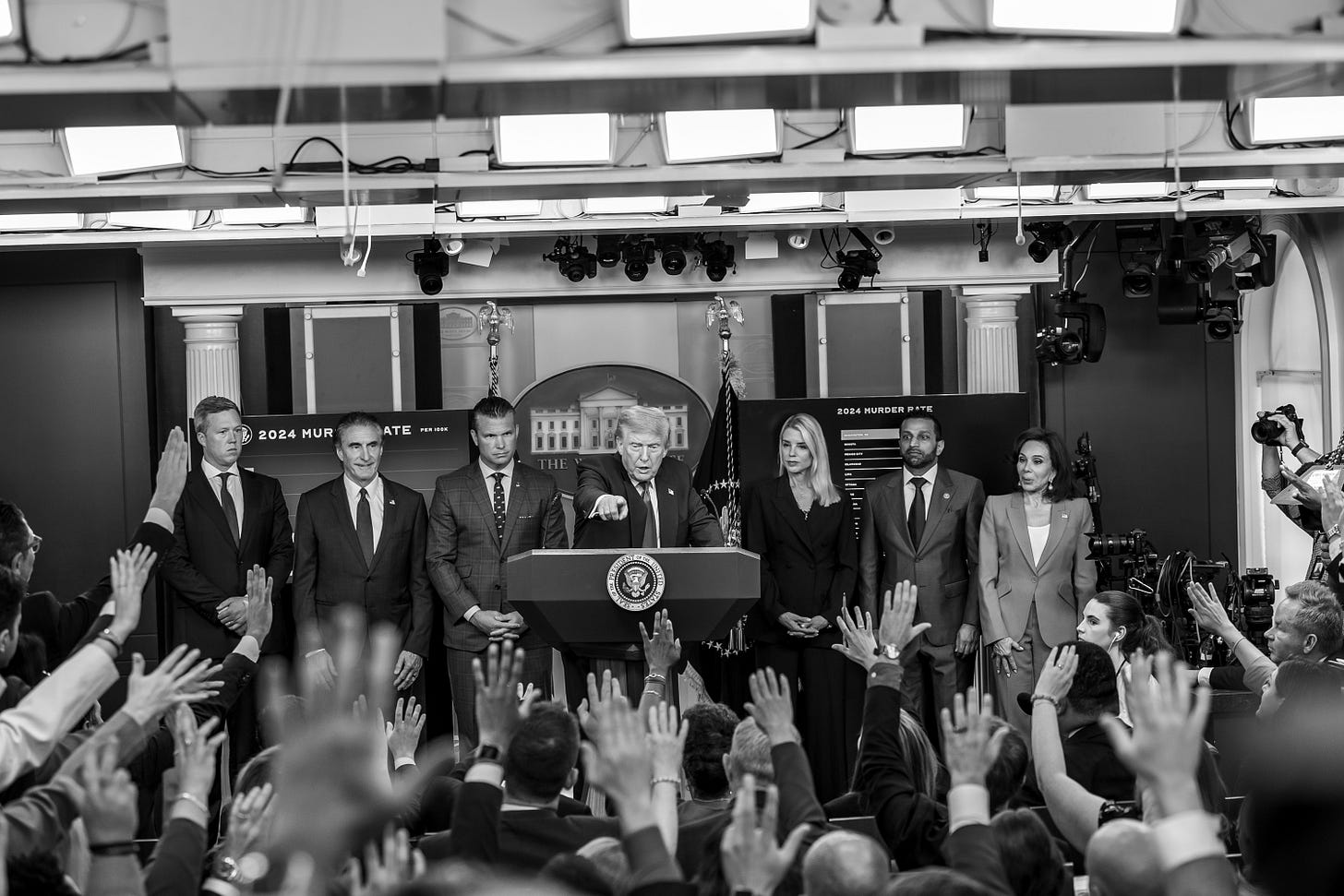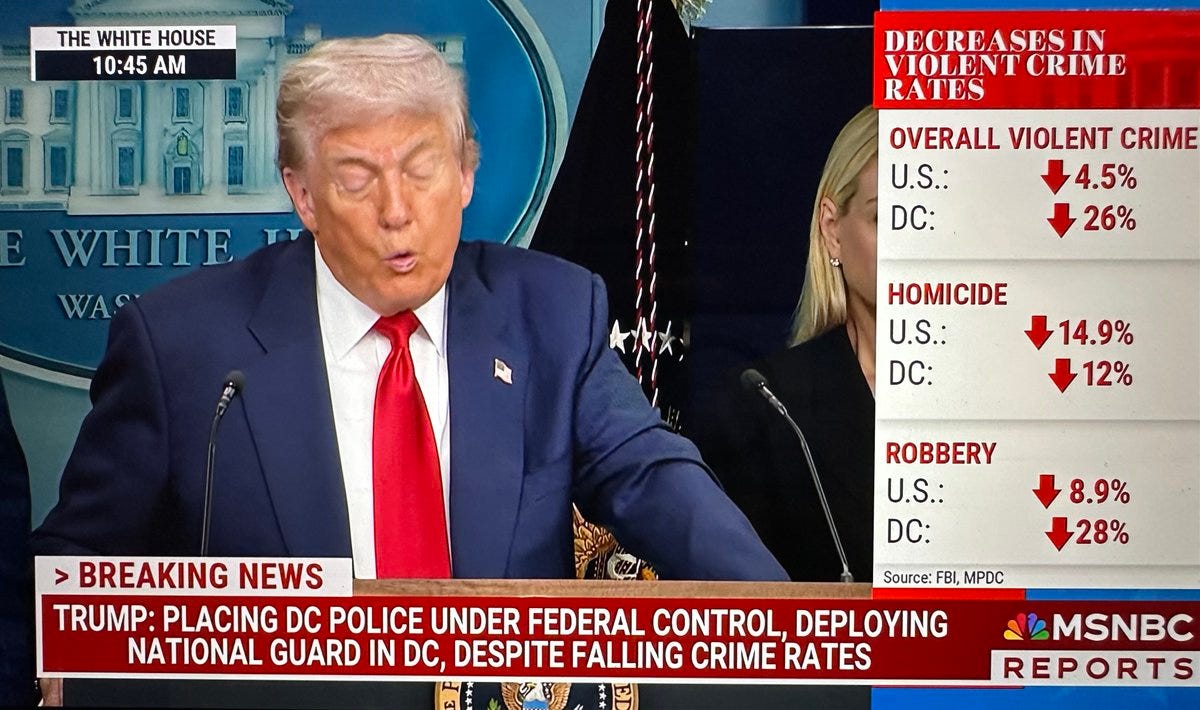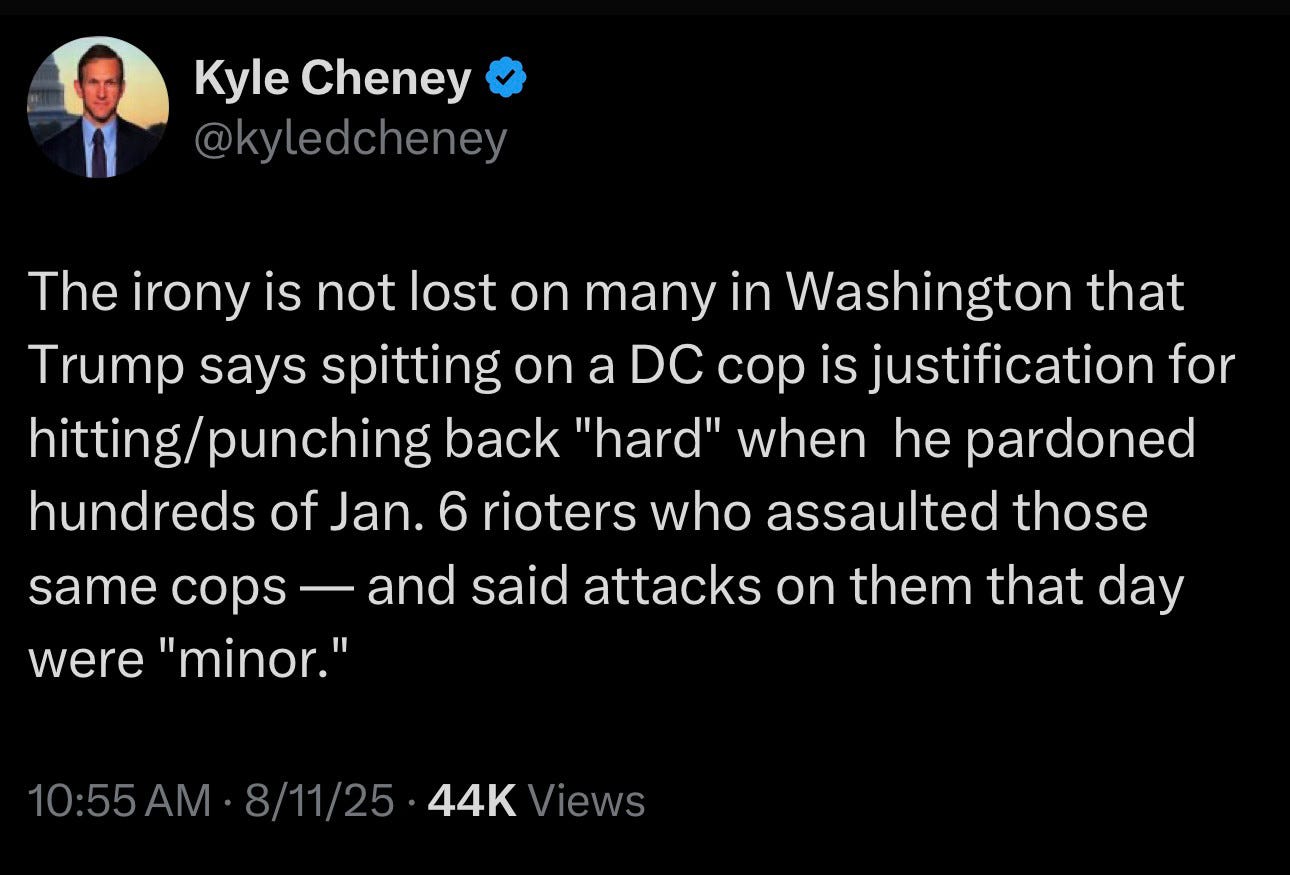Trump's D.C. Power Grab Isn't About Crime. It's About Authoritarian Spectacle.
With scandals mounting and his economy slowing, Trump is fabricating a D.C. emergency despite steep crime declines. It's a spectacle to justify authoritarian overreach and mask his political weakness.

Thank you for reading! In the face of unrelenting disinformation and authoritarian actions, clear truth-telling and independent media are a necessity. If you value in-depth analysis through a pro-democracy lens, consider becoming a free or paid subscriber to my newsletter. Paid subscribers empower this work and gain access to exclusive benefits. Your support makes a difference.
Everyone needs to be crystal clear about what is happening right now.
President Trump’s federal takeover of D.C. police and deployment of National Guard troops is an authoritarian stunt built on a foundation of lies. It’s yet another fake “emergency” being declared as a pretext to flex presidential power, deflect from his mounting scandals, and distract from the fact that he’s profiting from the presidency while passing policy that kicks millions of vulnerable people off their healthcare.
To put it simply, Trump needs a crisis. This D.C. takeover is a manufactured show of force designed to mask his deepening political weakness. Trump continues to face growing questions about his cover-up of the Epstein Files, he just oversaw the worst three months of job growth since the pandemic, his signature “Big Beautiful Bill” legislation is unpopular, and his Gallup approval rating is at a second-term low of 37%.
These aren’t just bad optics; they’re political liabilities that threaten Republican control of Congress in 2026. For Trump, a fabricated emergency in the nation’s capital is something he sees as a perfect distraction. He believes that crime is a winning issue for him. By inventing a crime crisis in D.C., he creates a spectacle to rally his base, falsely justify authoritarian measures, and shift the national conversation away from his deepening vulnerabilities.
This is all, indeed, a total fabrication. While crime is declining across the country, including in D.C., Trump is exploiting anecdotes as a pretense for authoritarian overreach.
According to a January statement from the Department of Justice, violent crime in D.C. was down 35% from 2023 to 2024, hitting a 30-year low. And according to D.C. police data, violent crime today is down 26% from this time last year.
On Monday, while President Trump announced his federal takeover of D.C. law enforcement and lied about crime being “out of control,” MSNBC displayed the steep declines in crime data across all major categories in D.C. and the U.S. overall.
Perception of crime has often been disconnected from reality, as Justin Glawe pointed out in his latest Public Notice article, titled, “Crime is down. But Trump's authoritarian power grabs are escalating.”
“A Gallup poll in October found that 64 percent of Americans believed crime had gone up in 2024, but new data from the FBI shows that is not the case. In fact, 2024 saw the lowest levels of violent crime since 1969, with violent crime down 4.5 percent across the country, including a 14.9 percent drop in murders.”
The feeling that crime is out of control is likely fueled by right-wing media fear-mongering. I’ve written about this many times before, particularly in my 2024 article headlined, “How Trump Uses Disinformation To Fabricate His Authoritarian Unreality.” I noted how Trump and his right-wing allies can’t win on the issues as they are, so they create a false dystopian reality, including repeated claims that crime is up when it’s seen historic declines.
Of course, no one is arguing that there is zero crime in D.C. What is being argued is that crime is nowhere near emergency levels, and Trump’s moves indicate his goal is more about authoritarian spectacle than it is about reducing crime.
To be fair, there have been some very real high-profile incidents of crime in D.C. recently, including the violent attack of former DOGE staffer Edward “Big Balls” Coristine by teenagers, which appeared to trigger this wider crackdown by Trump. In another case, the May murder of 2 Israeli Embassy staffers outside the Capital Jewish Museum in D.C. sparked wide, justifiable outrage.
There are also very real issues of juvenile crime in D.C., which sparked the creation of a new Juvenile Investigative Response Unit in April. But given all the crime data, it’s clear that these are problems that the D.C. police can and have been handling. The solution to juvenile crime is not a federal takeover and deployment of the National Guard. But I guess Trump sees fear-mongering about Black teenagers as beneficial to him politically.
D.C. Mayor Muriel Bowser responded to the move by saying, “While this action today is unsettling and unprecedented, I can't say that, given some of the rhetoric of the past, that we're totally surprised.” But Bowser appeared to concede that she doesn’t have legal grounds to challenge this move.
In order to legally justify this move in D.C., the Trump Administration is invoking Section 740 of the Home Rule Act, which allows for the “Emergency Control of Police.” The section goes on to say that the President can determine “that special conditions of an emergency nature exist which require the use of the Metropolitan Police force for Federal purposes.” According to the law, Trump can continue the federal takeover for up to 30 days, at which point Congress will need to authorize its continuation.
This follows a trend of Trump declaring fake emergencies, then exploiting those declarations as false justifications for expanding his power. Trump did this in LA in June when he deployed the National Guard to quell protests that were already under control. Trump also did this with immigration, seeking to justify his crackdowns. Even his tariff policy uses this tactic. Adam Liptak at The New York Times broke this down well in his June article headlined, “Trump Declares Dubious Emergencies to Amass Power, Scholars Say”:
Citing this series of crises, he has sought to draw on emergency powers that Congress has scattered throughout the United States Code over the centuries, summoning the National Guard to Los Angeles over the objections of California’s governor, sending scores of migrants to El Salvador without the barest hint of due process and upending the global economy with steep tariffs.
Legal scholars say the president’s actions are not authorized by the statutes he has cited and are, instead, animated by a different goal.
“He is declaring utterly bogus emergencies for the sake of trying to expand his power, undermine the Constitution and destroy civil liberties,” said Ilya Somin, a libertarian professor at Antonin Scalia Law School who represents a wine importer and other businesses challenging some of Mr. Trump’s tariffs.
Trump needs crises in order for his extreme ideas to have any sort of basis, not just legally, but politically.
After trying and failing in LA, Trump is now bringing his dystopian crime narrative to D.C. During his press conference, he teased that this could come to other cities like Oakland, Chicago, Baltimore, and New York City. Of course, like in LA, these cities are within states which are run by governors, their National Guards are under gubernatorial control, and their local police forces cannot be legally taken over by the federal government in the way D.C.’s can.
Another notable part of this is the fact that, like D.C., all of these cities Trump named are also seeing drops in crime. These cities also all have Black mayors, which likely isn’t a coincidence.
I’d also be remiss not to point out the wild hypocrisy of this entire spectacle when the largest criminal act in D.C. of the 2020s was January 6, an insurrection incited by Donald Trump himself. Peter Baker of The New York Times put this well in a post on Bluesky:
Also, Politico’s Kyle Cheney really nailed this in a post on X:
I’d like to add my voice to those calling out Trump’s hypocrisy by saying this:
If President Trump were serious about cutting D.C.’s already declining crime rate, he’d leave the White House and take the other convicted criminals in his administration with him.





You wrapped it all up well, Ahmed, with lots of references. I especially enjoyed your last remark though.